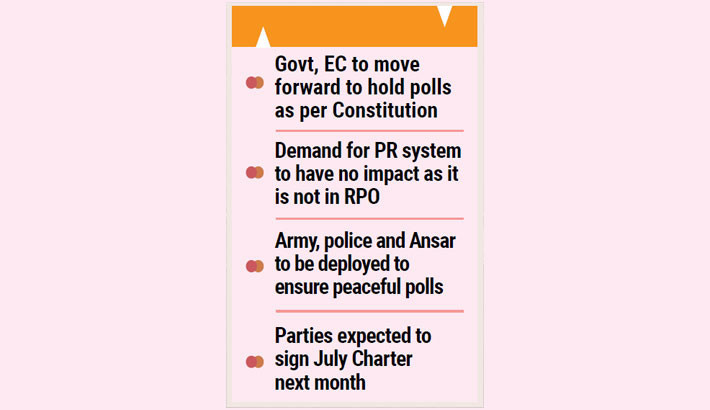Focus now on, polls for democratic power shift in February
Political parties expected to sign July Charter in October, after Prof Yunus returns from the UNGA meeting: Sources

Now it is only a matter of time before the current interim government transfers power to an elected one, as all the stakeholders — including the Election Commission (EC) and the political parties — move apparently inexorably towards the 13th National Election, scheduled for early February next year.
Election preparations will gain new momentum after Chief Adviser Prof Muhammad Yunus returns from the United Nations General Assembly (UNGA), which is being held in New York.
At the same time, the people will also get a new sense of the upcoming polls with the political parties’ election campaigns, which are likely to start soon.
The political parties are expected to sign the July Charter in October, after Chief Adviser Prof Muhammad Yunus returns from the UNGA meeting, said sources.
Dispelling speculation about the proportional representation (PR) system, Chief Election Commissioner (CEC) AMM Nasir Uddin told journalists at the EC on Thursday that the next parliamentary election will be held according to the Representation of the People Order (RPO), which does not mention the PR system.
He also said the EC has been moving ahead with all the necessary preparations to hold the parliamentary election in the first half of February 2026, ahead of the holy month of Ramadan.
The CEC said Chief Adviser Prof Muhammad Yunus has been assuring everyone that the election will be held in February. “He wants to transfer power in a democratic way and deliver a free, fair, and historic election. We are working to implement his words.”
Rejecting any possibility of bias, the CEC said the EC will act only within the framework of the law and Constitution.
On Friday, Election Commissioner Md Anwarul Islam Sarker said Jamaat’s demand for the PR system and the issue of allocating a symbol to the NCP would not have any impact on the election.
“The Election Commission is a constitutional institution. All activities are being and will be conducted according to existing laws,” he said.
The commission cannot and will not act outside the law, he said at a workshop titled “Identifying and Overcoming Challenges Faced by Polling Officials in the Election Process”, held at Satu Hall in Chapainawabganj.
Election Commissioner Anwarul Islam said officials who engaged in illegal activities in past elections will not be given any responsibilities in the 13th National Parliamentary Election. The matter is being closely monitored, and such officials will be excluded.
Meanwhile, the interim government is also working to ensure a stable law and order situation by training more than 8 lakh law enforcement personnel to carry out election duties, said sources.
Among them, there will be around 1 lakh army personnel, 1.41 lakh police officers, 47,000 members of the affiliated and general Ansar (armed), 47,000 Ansar and VDP personnel (armed with sticks), another 47,000 Ansar and VDP personnel (with sticks only), and 94,000 village police.
Around 40,000 body cameras are being purchased for police officers on election duty. The proposal was approved on 23 September at a meeting of the Economic Affairs Advisory Committee chaired by Economic Adviser Salehuddin Ahmed.
Home Affairs Adviser Lt Gen (retd) Md Jahangir Alam Chowdhury on Wednesday said, “Members of the army, navy, and air force will carry out their duties during the election. At present, around 30,000 army personnel are deployed in the field, which will rise to nearly 1 lakh during the election.
“In addition, members of the police, Border Guard Bangladesh, Ansar, Bangladesh Coast Guard, and the Rapid Action Battalion will also be deployed, with the administration overseeing everything.”
EC moves ahead
Some work has already begun according to the election action plan, and the EC is set to grant registration to five new political parties, said sources.
As part of the preparations for the upcoming 13th National Parliamentary Election, 70% of election material procurement has already been completed, said Akhtar Ahmed, senior secretary of the Election Commission Secretariat.
He expressed his hope that the remaining necessary materials would be delivered within this month.
The EC will begin electoral dialogues with different stakeholders, including political parties and civil society members, on 28 September, he said.
“The talks will first be held with civil society representatives and teachers,” he said.
Besides, the commission finalised the delimitation of 300 parliamentary constituencies on 4 September, after scrapping a seat in Bagerhat and adding one in Gazipur.
Moreover, the second phase of the supplementary draft voter list has already been published. The final voter list for the next election will be published on 30 November, with the draft to be released on 1 November.
During a meeting with Pakistan Prime Minister Shehbaz Sharif on the sidelines of the United Nations General Assembly (UNGA) at the UN Headquarters in the USA on Wednesday, Chief Adviser Prof Muhammad Yunus said Bangladesh is on course to hold its general election in February next year. He expressed his hope that the major political reforms proposed by 11 national commissions would lead to meaningful political transformation.
He said that talks between the National Consensus Commission and political parties are in their final stages, and parties are expected to sign a “July Charter” encompassing key constitutional and political reforms.
“These reforms are aimed at preventing the rise of another autocrat in Bangladesh,” Prof Yunus said.
The EC is to finalise observer registration by 22 October and issue certificates by 15 November. All permissions for both local and international observers and journalists will be completed by 15 November.
Election manuals, guidelines, posters, etc. are to be printed by 15 September. Election training programmes will begin on 29 August and continue until 4–5 days before polling.
An inter-ministerial meeting is to be held on 31 October, and ICT-related tasks are to be completed by that date, said sources.
The reporter can be reached at [email protected]
Edited by Mohammad Mamunur Rashid


